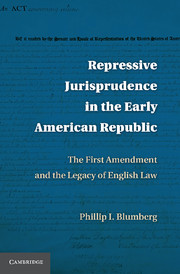 Repressive Jurisprudence in the Early American Republic
Repressive Jurisprudence in the Early American Republic Book contents
- Frontmatter
- Contents
- Acknowledgments
- 1 Political and Jurisprudential Worlds in Conflict in the New Republic
- 2 Politics in the New Republic
- 3 Criminal Libel in the Colonies, the States, and the Early Republic During the Washington Administration
- 4 Federalist Partisan Use of Criminal and Seditious Libel – Statutory and Common Law – During the Tumultuous Adams Administration
- 5 Criminal Libel During the Jefferson and Madison Administrations, 1800–1816
- 6 Partisan Prosecutions for Criminal Libel in the State Courts: Federalists Against Republicans, Republicans Against Federalists, and Republicans Against Dissident Republicans in Struggles for Party Control
- 7 Established Jurisprudential Doctrines (Other than Criminal Libel) Available in the New Republic for Suppression of Anti-Establishment Speech
- 8 Still Other 19th-Century Doctrines for Suppression of Anti-Establishment Speech: The Law of Blasphemy and the Slave State Anti-Abolition Statutes
- 9 Conclusion
- Table of Cases
- Index
2 - Politics in the New Republic
Published online by Cambridge University Press: 05 October 2010
- Frontmatter
- Contents
- Acknowledgments
- 1 Political and Jurisprudential Worlds in Conflict in the New Republic
- 2 Politics in the New Republic
- 3 Criminal Libel in the Colonies, the States, and the Early Republic During the Washington Administration
- 4 Federalist Partisan Use of Criminal and Seditious Libel – Statutory and Common Law – During the Tumultuous Adams Administration
- 5 Criminal Libel During the Jefferson and Madison Administrations, 1800–1816
- 6 Partisan Prosecutions for Criminal Libel in the State Courts: Federalists Against Republicans, Republicans Against Federalists, and Republicans Against Dissident Republicans in Struggles for Party Control
- 7 Established Jurisprudential Doctrines (Other than Criminal Libel) Available in the New Republic for Suppression of Anti-Establishment Speech
- 8 Still Other 19th-Century Doctrines for Suppression of Anti-Establishment Speech: The Law of Blasphemy and the Slave State Anti-Abolition Statutes
- 9 Conclusion
- Table of Cases
- Index
Summary
Introduction
American society has changed dramatically from its early days as the New Republic in many ways of which we are instantly aware: extensive change in the ethnic, religious, and immigrant composition as well as explosive growth of the territory, the population, vast changes in its economy, urbanization, and environment, and culture, the emancipation of the enslaved black population, the role of the sexes, and in many other profound respects. It has changed in other major respects that are not so vividly apparent. To understand the role that jurisprudential doctrines used for suppression of dissident speech, particularly criminal libel, played in that very different society, it is essential to understand the political and social context of the times. These too are dramatically different from those in the more mature America that subsequently emerged.
The critical reality is that the New Republic was a very new country in which some of the fundamental political institutions and political culture were still in the process of development. Our examination of the jurisprudence of the times dealing with dissident speech, therefore, is best deferred until readers have identified the key features of the political world in which it evolved and have an understanding of the fundamental departures from the modern experience.
The Threat of “Factions,” the Rise of Political Parties, and Lack of a Concept of a “Loyal” Opposition
As is well known, in the full flush of the idealism that surrounded the founding of the country and the adoption of the Constitution, the leaders of the day elected by reason of their local prominence naively concluded that the New Republic would similarly be directed by a select group of individuals with government policy determined as a result of their deliberations.
- Type
- Chapter
- Information
- Repressive Jurisprudence in the Early American RepublicThe First Amendment and the Legacy of English Law, pp. 23 - 51Publisher: Cambridge University PressPrint publication year: 2010


